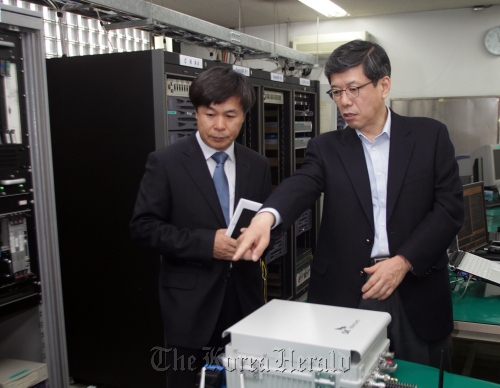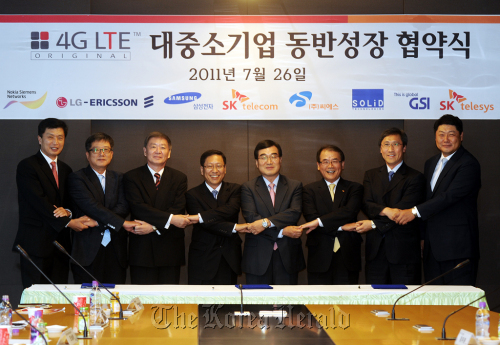Country’s top mobile carrier signs shared growth agreement with 360 partners
SK Telecom, the country’s top mobile carrier, is on the road to emphasizing mutual growth as it embarks on a number of projects with its smaller subcontractors.
On Tuesday, SKT pledged mutual growth with its seven partners on establishing a nationwide network for fourth generation Long Term Evolution technology. The seven partners are LG-Ericsson, Nokia Siemens Networks, GS Instruments, Samsung Electronics, CS, Solid Technologies and SK Telesys.
The plan was devised as the small and mid-sized repeater manufacturers are suffering financial difficulties as telecom firms move from repeaters to small base stations with the introduction of LTE networks.
Repeaters had filled in gaps and amplified voice signals for areas which were difficult to cover with base stations, but the demand for the repeaters has been decreasing with the carrier’s launch of 4G networks last month.
Small base stations, or remote radio units, are capable of handling data efficiently.
“We hope that the local telecommunications device market develops through the effort and that practical mutual growth measures are seen between the big and small-scale companies,” said Kwon Hyok-sang, executive vice president of network division at SKT.
Through the partnership, the three smaller manufacturers ― CS, GS Instruments and Solid Technologies ― are planning to supply about 70 billion won worth of telecommunication devices to SKT over a three-year period, according to SKT officials.
The larger equipment vendors will share their technologies with the smaller companies and work closely together in the all stages of base station manufacturing to achieve mutual growth.
SKT has announced earlier in May that it had completed the signing of a mutual growth and fair trade agreement with 360 partners.
SK Telecom, the country’s top mobile carrier, is on the road to emphasizing mutual growth as it embarks on a number of projects with its smaller subcontractors.
On Tuesday, SKT pledged mutual growth with its seven partners on establishing a nationwide network for fourth generation Long Term Evolution technology. The seven partners are LG-Ericsson, Nokia Siemens Networks, GS Instruments, Samsung Electronics, CS, Solid Technologies and SK Telesys.
The plan was devised as the small and mid-sized repeater manufacturers are suffering financial difficulties as telecom firms move from repeaters to small base stations with the introduction of LTE networks.
Repeaters had filled in gaps and amplified voice signals for areas which were difficult to cover with base stations, but the demand for the repeaters has been decreasing with the carrier’s launch of 4G networks last month.
Small base stations, or remote radio units, are capable of handling data efficiently.
“We hope that the local telecommunications device market develops through the effort and that practical mutual growth measures are seen between the big and small-scale companies,” said Kwon Hyok-sang, executive vice president of network division at SKT.
Through the partnership, the three smaller manufacturers ― CS, GS Instruments and Solid Technologies ― are planning to supply about 70 billion won worth of telecommunication devices to SKT over a three-year period, according to SKT officials.
The larger equipment vendors will share their technologies with the smaller companies and work closely together in the all stages of base station manufacturing to achieve mutual growth.
SKT has announced earlier in May that it had completed the signing of a mutual growth and fair trade agreement with 360 partners.


Company president Ha Sung-min stressed that he would go by three major practices: holding active communications with its subcontractors; forming the ground for mutual growth through sharing and cooperation; and constructing a top class ecosystem which has speed, execution ability and cohesive force.
Ha also promised the company’s second-tier suppliers, including K-Bell, that it will apply the mutual growth scheme to the group as well.
In a related effort, SKT said Thursday that it will enable potential smartphone application developers or small venture firms living outside of Seoul to take part in its free educational sessions offered by its T Academy.
The company said it signed an agreement with regional institutes and organizations, such as Daegu Digital Industry Promotion Agency, the Chungnam Culture Technology Industry Agency and Hannam University in Daejeon, to begin the sessions as early as September.
It will also provide up to 50 million won in venture support funds and feature services and programs to assist the one-person venture firms, said SKT officials.
“As a one-stop service is to be presented to those living in provincial areas, we have high hopes that we would see an increasing number of mobile applications that could be used often in our daily lives,” said an SKT official.
The move comes after SKT opened a collaborative innovation space within Seoul National University last year to give support to application start-ups.
The center is divided into three different sections T Academy, Mobile Device Test Center and the Open Innovation Center.
Developers could receive professional training at T Academy, test different applications and programs on various mobile devices at the MD Test Center, and get started on a business with support from the OIC including funding, office space, business administration and marketing.
A total of 5,500 people have received training at the company’s T Academy, built in March last year.
In terms of funding for the company’s shared growth plan with its subcontractors, it has contributed 132.4 billion won in a support fund for seven different small and mid-sized firms, apart from its contribution in the KIF fund.
The mobile carrier has also been chipping in 70 billion won in a shared growth fund, which totals 145 billion won, with three banks since 2009.
The fund is used to lower the loan interest rates ― up to 2.4 percent ― for its smaller suppliers, according to company officials. A single firm could apply for a loan as big as 3 billion won.
“The most important factor in going forward with share growth activities is showing authenticity,” said Ha. “We will produce satisfying results involving mutual growth by actively engaging in communications with our suppliers and partners.”
By Cho Ji-hyun (sharon@heraldcorp.com)











![[Today’s K-pop] BTS pop-up event to come to Seoul](http://res.heraldm.com/phpwas/restmb_idxmake.php?idx=644&simg=/content/image/2024/04/17/20240417050734_0.jpg&u=)




![[KH Explains] Hyundai's full hybrid edge to pay off amid slow transition to pure EVs](http://res.heraldm.com/phpwas/restmb_idxmake.php?idx=652&simg=/content/image/2024/04/18/20240418050645_0.jpg&u=20240419100350)

![[Today’s K-pop] Zico drops snippet of collaboration with Jennie](http://res.heraldm.com/phpwas/restmb_idxmake.php?idx=642&simg=/content/image/2024/04/18/20240418050702_0.jpg&u=)